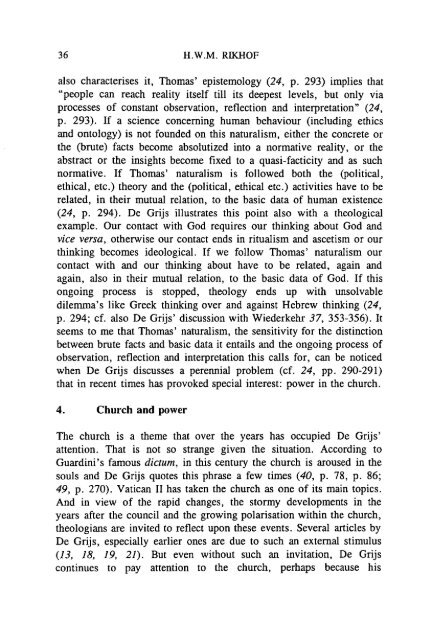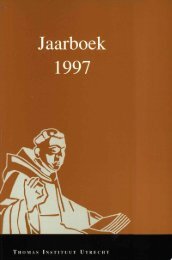Jaarboek Thomas Instituut 1995 - Thomas Instituut te Utrecht
Jaarboek Thomas Instituut 1995 - Thomas Instituut te Utrecht
Jaarboek Thomas Instituut 1995 - Thomas Instituut te Utrecht
You also want an ePaper? Increase the reach of your titles
YUMPU automatically turns print PDFs into web optimized ePapers that Google loves.
36 H.W.M. RIKROF<br />
also charac<strong>te</strong>rises it, <strong>Thomas</strong>' epis<strong>te</strong>mology (24, p. 293) implies that<br />
"people can reach reality itself till its deepest levels, but only via<br />
processes of constant observation, reflection and in<strong>te</strong>rpretation" (24,<br />
p. 293). If a science concerning human behaviour (including ethics<br />
and ontology) is not founded on this naturalism, either the concre<strong>te</strong> or<br />
the (bru<strong>te</strong>) facts become absolutized into a normative reality, or the<br />
abstract or the insights become fixed to a quasi-facticity and as such<br />
normative. If <strong>Thomas</strong>' naturalism is followed both the (political,<br />
ethical, etc.) theory and the (political, ethical etc.) activities have to be<br />
rela<strong>te</strong>d, in their mutual relation, to the basic data of human exis<strong>te</strong>nce<br />
(24, p. 294). De Grijs illustra<strong>te</strong>s this point also with a theological<br />
example. Our contact with God requires our thinking about God and<br />
vice versa, otherwise our contact ends in ritualism and ascetism or our<br />
thinking becomes ideological. If we follow <strong>Thomas</strong>' naturalism our<br />
contact with and our thinking about have to be rela<strong>te</strong>d, again and<br />
again, also in their mutual relation, to the basic data of God. If this<br />
ongoing process is stopped, theology ends up with unsolvable<br />
dilemma's like Greek thinking over and against Hebrew thinking (24,<br />
p. 294; cf. also De Grijs' discussion with Wiederkehr 37, 353-356). It<br />
seems to me that <strong>Thomas</strong>' naturalism, the sensitivity for the distinction<br />
between bru<strong>te</strong> facts and basic data it entails and the ongoing process of<br />
observation, reflection and in<strong>te</strong>rpretation this calls for, can be noticed<br />
when De Grijs discusses a perennial problem (cf. 24, pp. 290-291)<br />
that in recent times has provoked special in<strong>te</strong>rest: power in the church.<br />
4. Church and power<br />
The church is a theme that over the years has occupied De Grijs'<br />
at<strong>te</strong>ntion. That is not so strange given the situation. According to<br />
Guardini's famous dictum, in this century the church is aroused in the<br />
souls and De Grijs quo<strong>te</strong>s this phrase a few times (40, p. 78, p. 86;<br />
49, p. 270). Vatican II has taken the church as one of its main topics.<br />
And in view of the rapid changes, the stormy developments in the<br />
years af<strong>te</strong>r the council and the growing polarisation within the church,<br />
theologians are invi<strong>te</strong>d to reflect upon these events. Several articles by<br />
De Grijs, especially earlier ones are due to such an ex<strong>te</strong>rnal stimulus<br />
(13, 18, 19, 21). But even without such an invitation, De Grijs<br />
continues to pay at<strong>te</strong>ntion to the church, perhaps because his








